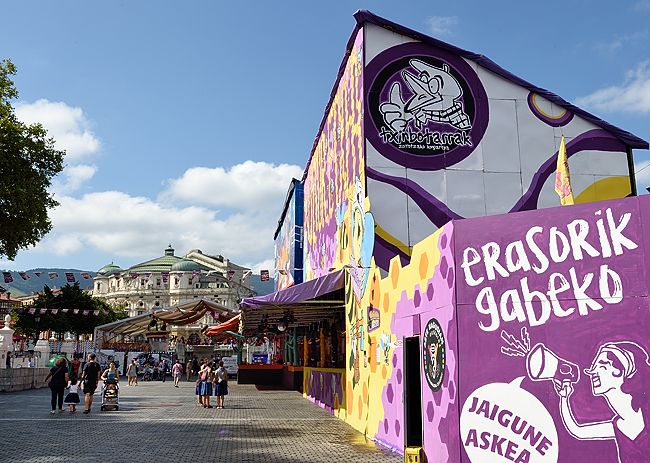“My God, these people are speaking Gallego!”
These were the thoughts that ran through this not-entirely-acculturated Yankee’s noggin while waiting my turn at the Día Basquiños supermarket in Santiago de Compostela. I hadn’t eaten since morning, had wandered far from the tourist quarter in search of a vendor that would sell staples to lug back to my hotel.
The market was busy, friendly. Customers knew one another, chatted animatedly in the queue. I felt bewildered; I couldn’t understand more than a few words spoken by many, despite three years in Spain.
This was when I realized that they weren’t speaking Spanish.
I mentioned this moment in my 2019 write-up on my Galicia trip. I didn’t say how much it dumbfounded me. Another language! Spanish, Catalan and Euskera were’t enough; Gallego, too!
Four and a half years after my expat move, understanding of this fundamental difference between European and U.S. life has finally sunk in. I can’t find stats to back me up, but am confident that Europeans (in major urban centers, at least, and more so in some countries than others) expect to deal regularly with people who don’t speak their native tongue, assume that they often will have to negotiate meaning between languages, and that they will reap obvious, indisputable benefits from learning a second language, or a third. This is a given, assumed, just as I took for granted as a California teenager that I would be practically crippled without a drivers’ license.
Spain hosts four full-fledged, widely spoken languages — Spanish, Catalan, Gallego and Euskera — in a country with a land area and population less than twenty percent greater than California’s. Not dialects: full-blown languages, hecho y derecho.
Catalan and Gallego are at least similar to Spanish. Euskera isn’t similar to anything, was spoken in the Basque Country when Hannibal was coaxing war elephants across the Alps. Some 750,000 Basques speak it today.
(Care for a taste? You can eyeball the Bilbao signage at the top of this post, or try Apaizaren eltzea, txikia baina betea. “The priest’s pot is small but full.” But you already knew that, didn’t you? What could be more intuitive?)
A funcionario stationed in a particularly remote Basque whistlestop told me that snooty locals pretended not to understand Spanish, wanted to chat only in Euskera. Public schoolers in Catalonia get only two hours of Spanish instruction a week; the rest is in Catalan.
More: in some Spanish films — Las Distancias and Los Fenómenos come to mind — hispanoparlantes chat agreeably with chums responding in Catalan or Gallego. Political archenemies Inés Arrimadas and Quim Torra regularly demonstrated this kind of code-switching in their parliamentary dust-ups in Barcelona. (Examples one, two. She speaks Spanish, he [and Parliament President Roger Torrent] speaks Catalan. I’d avoid inviting Inés and Quim to the same party.) And it doesn’t happen only in Spain: a fellow expat told me that such lingo juggling is also common in his EU family home, a few thousand kilometers north. Mom feels more comfortable in Polish, speaks it if visitors aren’t on hand. Other family members understand her, but answer in Swedish.
This is how life has evolved here. It’s called the Old World for a reason. Michelangelo’s Sistine Chapel frescoes were already eighty years old when Mayflower Pilgrims were freezing to death on Cape Cod. A frequent flier might polish off a six hundred kilometer trip today in an hour aboard an A319; in the Middle Ages, such a distance might have made for the trek of a lifetime, if undertaken at all. Idioms had the isolation needed to differ, take root and develop separately.
An American fluent in three languages might be deemed a savant; in Spain, I meet trilinguals regularly. (Although undoubtedly more than I’d meet without my role in language exchanges.) One fellow believably claimed fluency in eight languages. A Beijing expat told me that her EU boyfriend speaks six.
Sometimes language transitions are graceful. In one scene in Las Distancias, a Spaniard switches without comment to the ‘universal language’ English when visited by a German. English fluency is widespread in northern Europe, assumed, a near given. Other times, one muddles through. A Peru expat told me that his Paris employer expected him to represent the company in an all-French conference only three months after his hire, with virtually no formal French training. A Madrileña hired to field Spanish customer support calls in Ireland was soon dumped unceremoniously into the English support queue when a co-worker didn’t show.
I have mixed feelings, still hold the views expressed at the end of my ‘Polygot Tips n’ Tricks’ post. I plan to stay put here, and would never live in a country long-term without learning its language. European life is richer, deeper, more fascinating and complex for its depth of cultures, languages, national histories. But I see the widespread assumption of fluency in one tongue as a major commercial advantage for the United States.
Fellow English-speaking Spain expats! Curious to know how your Spanish sounds to native ears? Can you take a joke? I offer two clips. Brace yourselves:
(♦) From Amanece, Que no es Poco. Actor Gabino Diego seems to have made a specialty of imitating us. I wish he didn’t do it so well.
(♦) Los Anillos de Saturno, perhaps a student film. The driver is the American, a ‘frontier Southerner,’ in the eyes of the actor.
(No need to feel self-conscious, potential visitor! Spaniards haven’t snickered at my gruesome accent yet, and I practically make the Gabino Diego in this clip sound like Antonio Banderas.)
